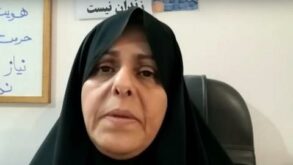Radiofarda – The Islamic Republic President Hassan Rouhani has warned the country’s powerful Guardian Council (GC) to avoid stricter vetting of candidates in the upcoming parliamentary elections next February.
“We should not believe that the tighter the filter is the better the results will be”, Rouhani asserted during a cabinet meeting on Wednesday.
As a control mechanism to prevent independent and opposition candidates to hold elected office, the Islamic Republic’s constitution has empowered the GC to review all candidates and pick a handful who are loyal to the regime.
Praising the first Islamic Consultative Assembly (Majles or parliament) elections held immediately after the downfall of Iran’s last monarch, Shah Mohammad Reza Pahlavi, Rouhani maintained, “Back then, there was no Council of Guardians (to qualify or disqualify candidates) or so many supervisory offices we have today. Nevertheless, we had the best-ever parliamentary election, and its result was also the best Majles ever.”/**/ /**/ /**/ SEE ALSO:Voter Indifference Is A Challenge For The Islamic Republic
The first national parliamentary election in the Islamic Republic was held on March 14, 1980, and the mid-ranking cleric Rouhani was elected as the representative of his home town Semnan.
“All those responsible for holding and monitoring the elections should work to increase people’s political enthusiasm” Rouhani asserted, adding without elaboration, “Holding good elections will defeat the U.S. and (other) enemies of the Iranian nation.”
Retorting against Rouhani’s remarks, the GC spokesman Abbas Ali Kadkhodaei fired back in a tweet, saying Rouhani is disregarding the Islamic Republic Constitution.
He also advised the President to avoid “political excitement” and keep away from promoting lawlessness.
The next parliamentary elections in the Islamic Republic is set for February 21, 2020.
The political groupings, supporting the so-called “moderate” Rouhani, in recent months have repeatedly raised their concerns over the next elections.
They have argued that “the Iranian people are so frustrated” it would almost be next to impossible to “lure them to the ballot boxes.”
Ex-President Mohammad Khatami (1997-2005), who is considered as the so-called reformists’ leader, has admitted on different occasions that people have lost trust in elections as a tool to reform the country’s political establishment.
While opposing the idea of boycotting the next elections, Khatami insisted on September 30 that the reformist camp would need to see the right conditions to accept presenting a list of candidates for parliament.
By “desirable conditions,” Khatami meant allowing more reformists to run for the parliamentary seats without being disqualified by the GC./**/ /**/ /**/ SEE ALSO:Party Leader’s Comments Signals Serious Rift In Iran’s Reform Camp
Khatami had earlier warned the Islamic Republic establishment that “if people are disappointed, those who want a regime change might find an opportunity for success.”
A survey by the Iranian Students Polling Agency showed that 28% of Iranians identify themselves as leaning Reformists, while 15% identify as leaning Principalist (hard-liner allies of the Islamic Republic Supreme Leader Ali Khamenei), Khabar Online reported in 2017.
However, widespread national protests in late December 2017 and early January 2018 reflected the fact that many Iranians were fed up with both factions; the dominant conservatives and the reformists who have always played second fiddle in managing the country.
“Conservatives, reformists, Your Days Are Over,” the protesters chanted in more than 100 cities across Iran.
Nevertheless, whenever the time for elections approaches, members of the reformist camp throw aside their lethargy and step forward, calling people to the ballot boxes.
 Shabtabnews In this dark night, I have lost my way – Arise from a corner, oh you the star of guidance.
Shabtabnews In this dark night, I have lost my way – Arise from a corner, oh you the star of guidance.


